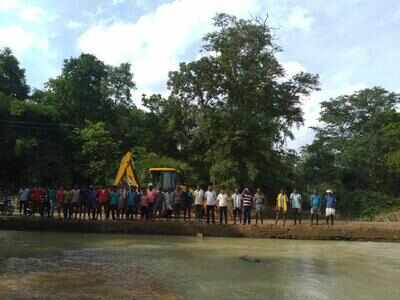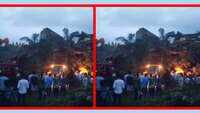
Nagpur: Around 60 tribals of Zinganoor village in Sironcha taluka of south Gadchiroli, led by a police sub-inspector, desilted the choked Koretogu nullah to divert flood waters through pipes below the bridge. This opened the bridge for traffic, after remaining submerged for over a week, allowing the civic administration to reach over a dozen villages.
The villages, which have many senior citizens, pregnant women and children, also could not organize their weekly markets for a fortnight, leaving them without bare necessities too. Accessing medical care and help in emergencies too was a challenge with the flood water flowing dangerously over the Koretogu bridge.
The tribals ensured security of police sub-inspector (PSI) Yuvraj Ghodke of Zinganoor police station, who supervised the work without his force for protection in the deep Maoist heartland, where rebels are known to attack solitary cops and consider killing officers as a major triumph.
During the six-hour work schedule, the villagers also restored a temporary road between Sironcha and Zinganoor, around 2km away from Koretogu nullah. This road too had been swept away in last week’s flood. The state transport bus is also likely to start operating now.
PSI Ghodke, who risked his life to lead the villagers in the desilting works in the forested stretch, around 12km away from his police station, said he appealed to villagers to join hands after being moved by their plight. “Every year, the bridge gets submerged and several villages remain disconnected for days, without essential and emergency services,” said the PSI, who is posted in the highly sensitive police station with his batchmate PSI Vishal Bodkhe.
“Tehsildar Ramesh Jaswant had visited the nullah on our request to assess the situation and plan a strategy to restore connectivity. His suggestion was to desilt the nullah and clear the sand-filled pipes to enable the flood water to flow away,” he said.
“I approached Zinganoor village for help, and they were happy to help. We contributed by hiring JCB machine and paid for it’s fuel. As I too wanted to remain at the site to oversee the work, the villagers encouraged me to come along, assuring to fight the Maoists if they came to get me,” said Ghodke, who had also built a makeshift hospital around a year ago at Zinganoor.
The villages, which have many senior citizens, pregnant women and children, also could not organize their weekly markets for a fortnight, leaving them without bare necessities too. Accessing medical care and help in emergencies too was a challenge with the flood water flowing dangerously over the Koretogu bridge.
The tribals ensured security of police sub-inspector (PSI) Yuvraj Ghodke of Zinganoor police station, who supervised the work without his force for protection in the deep Maoist heartland, where rebels are known to attack solitary cops and consider killing officers as a major triumph.
During the six-hour work schedule, the villagers also restored a temporary road between Sironcha and Zinganoor, around 2km away from Koretogu nullah. This road too had been swept away in last week’s flood. The state transport bus is also likely to start operating now.
PSI Ghodke, who risked his life to lead the villagers in the desilting works in the forested stretch, around 12km away from his police station, said he appealed to villagers to join hands after being moved by their plight. “Every year, the bridge gets submerged and several villages remain disconnected for days, without essential and emergency services,” said the PSI, who is posted in the highly sensitive police station with his batchmate PSI Vishal Bodkhe.
“Tehsildar Ramesh Jaswant had visited the nullah on our request to assess the situation and plan a strategy to restore connectivity. His suggestion was to desilt the nullah and clear the sand-filled pipes to enable the flood water to flow away,” he said.
“I approached Zinganoor village for help, and they were happy to help. We contributed by hiring JCB machine and paid for it’s fuel. As I too wanted to remain at the site to oversee the work, the villagers encouraged me to come along, assuring to fight the Maoists if they came to get me,” said Ghodke, who had also built a makeshift hospital around a year ago at Zinganoor.

Coronavirus outbreak
Trending Topics
LATEST VIDEOS
More from TOI
Navbharat Times
Featured Today in Travel
Quick Links
Kerala Coronavirus Helpline NumberHaryana Coronavirus Helpline NumberUP Coronavirus Helpline NumberBareilly NewsBhopal NewsCoronavirus in DelhiCoronavirus in HyderabadCoronavirus in IndiaCoronavirus symptomsCoronavirusRajasthan Coronavirus Helpline NumberAditya ThackerayShiv SenaFire in MumbaiAP Coronavirus Helpline NumberArvind KejriwalJammu Kashmir Coronavirus Helpline NumberSrinagar encounter
Get the app







